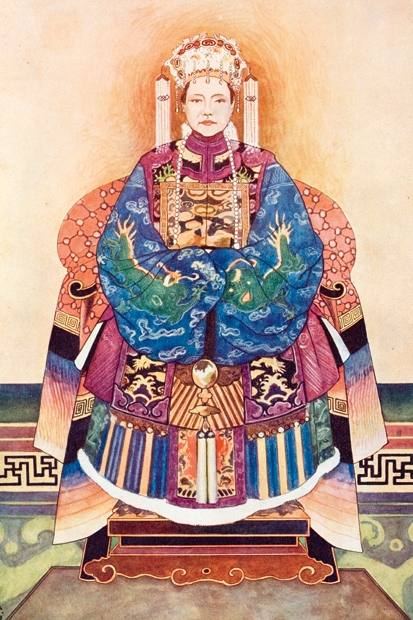For susceptible Englishmen of a certain inclination — like Sir Edmund Backhouse or George Macdonald Fraser — the Empress Dowager Cixi was the ultimate oriental sex kitten, an insatiable, manipulating dominatrix who brought the decadent Manchu empire to its knees. While all seems lost, as foreign troops burn the Summer Palace in Peking, she is to be found, thinly disguised, in the pages of Flashman and the Dragon, locked in our hero’s rugged embrace. More recently, it has suited communist historians to concur with Flashman that she was ‘a compound of five Deadly Sins — greed, gluttony, lust, pride and anger — with ruthlessness, cruelty and treachery thrown in’.
In present-day China her rule is blamed for half a century of foreign bullying, humiliation and decline. Every visitor to the Summer Palace is shown the beautiful lakeside pavilion in the shape of an elegant marble pleasure boat and told how Cixi spent funds destined for the imperial navy on such extravagant fripperies — which ultimately led to Japan’s victory over China in 1895 and the loss of Taiwan.
Between 1860, when an Anglo-French expeditionary force sacked the Summer Palace in the Second Opium War, and her death in 1908, this half-literate, eighth-rank concubine somehow ruled China from behind a screen. She governed first through her only son, the Emperor Tongzhi, and after his early death through two adopted children. In 1911, the last emperor of China, Puyi, abdicated, ushering in the chaotic warlord era and then the dictatorship of Chiang Kai-shek.
Our image of Cixi and her court has been heavily influenced by the ardent nationalist Kang Youwei, who fled abroad in 1898 after a failed conspiracy. Kang, having been a close associate of the Emperor Guangxu, claimed he knew all about the debauched goings-on in the Forbidden City.







Comments
Join the debate for just £1 a month
Be part of the conversation with other Spectator readers by getting your first three months for £3.
UNLOCK ACCESS Just £1 a monthAlready a subscriber? Log in